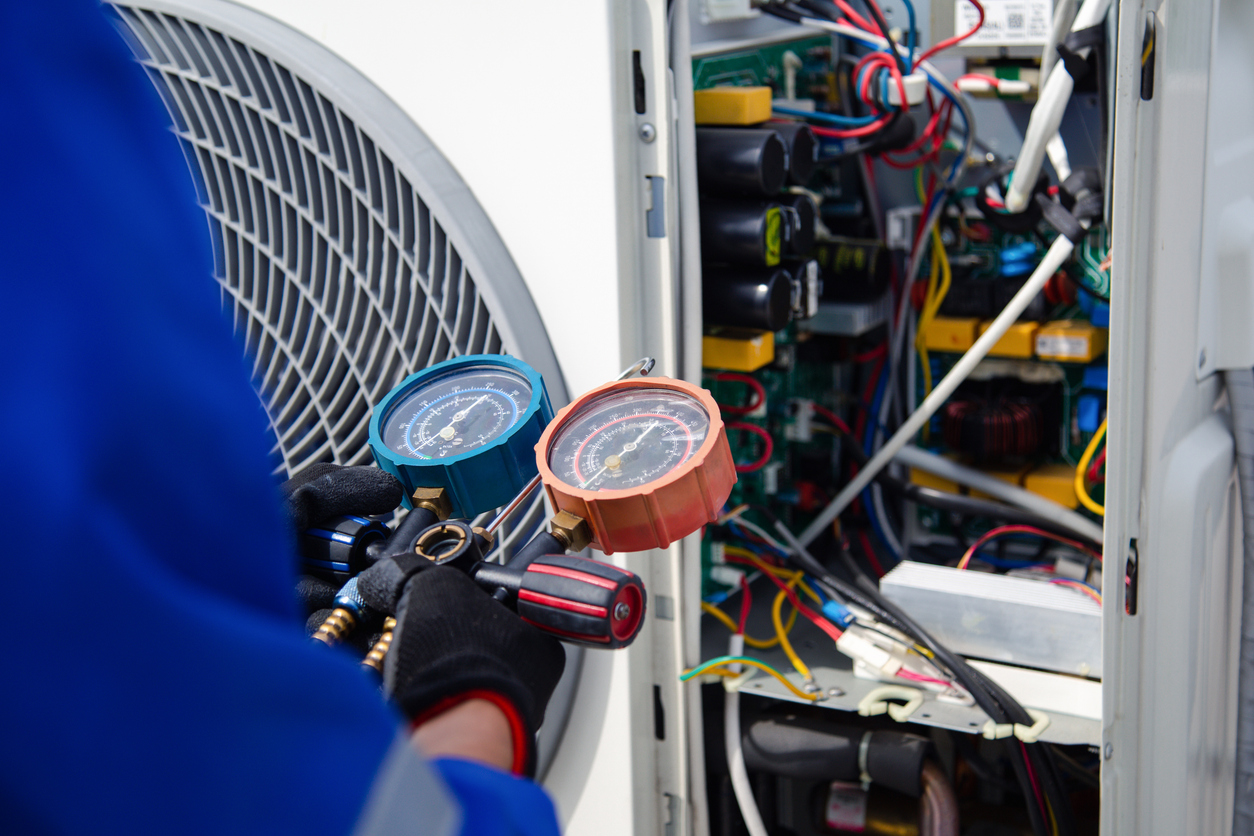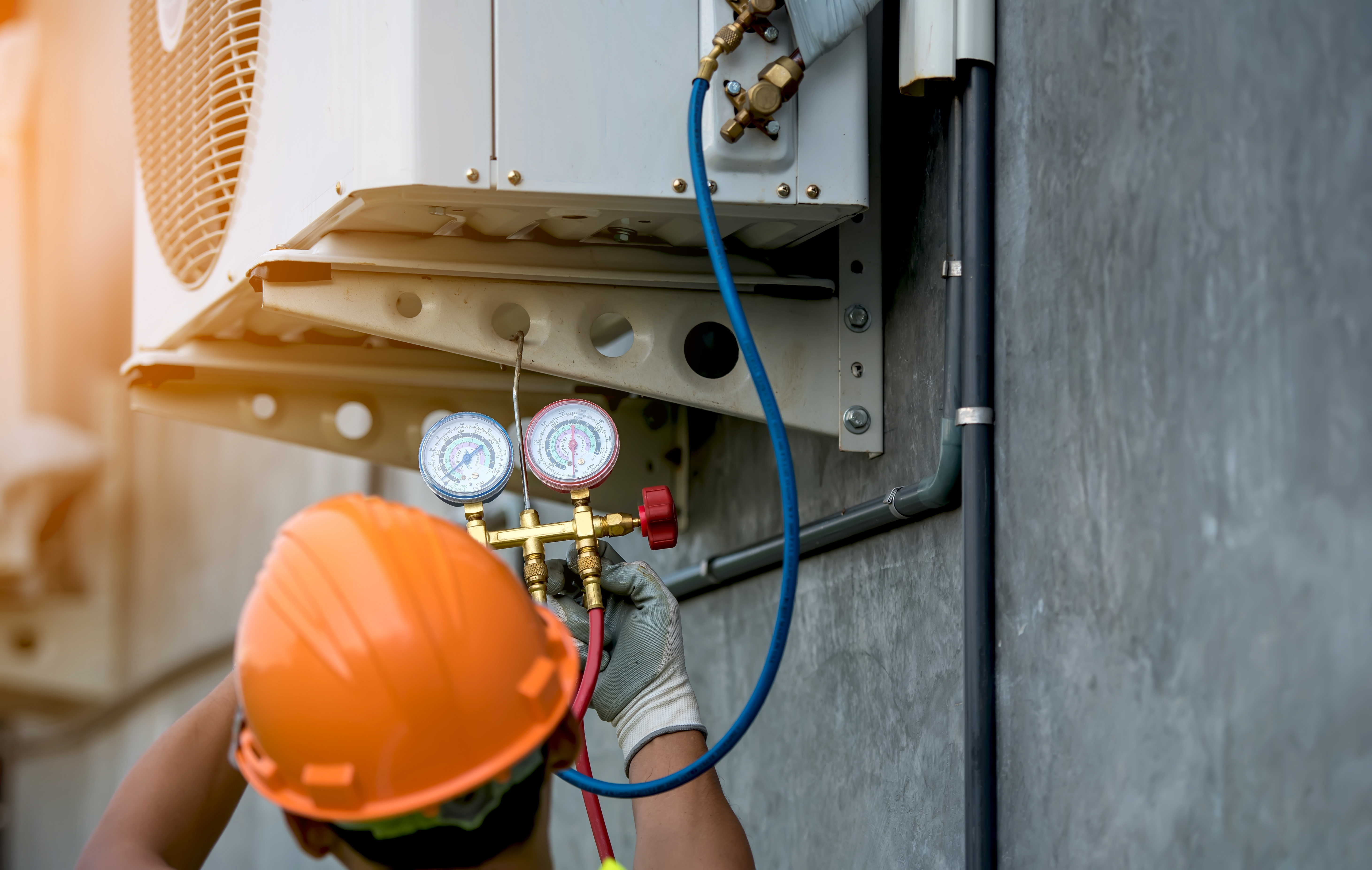All Concerning Heating And Cooling: Identifying Common Issues and Effective AC Repair Service Methods
Heating and cooling systems are essential for preserving indoor comfort. Understanding their elements and performance is important for recognizing usual problems. Property owners typically encounter troubles such as inadequate cooling, unusual smells, or increasing power prices. These signs can suggest underlying concerns that might call for focus. Exploring DIY troubleshooting techniques can be helpful, yet knowing when to seek expert help is equally crucial. What actions can be required to guarantee resilient efficiency?
Comprehending Your A/c System: Components and Functionality
An a/c system, usually thought about the foundation of interior environment control, includes a number of vital parts that collaborate to control temperature and air high quality. The key components include the heating device, ventilation system, and a/c system. The home heating device, generally a furnace or central heating boiler, generates warmth during chillier months, while the air conditioning device cools down indoor areas throughout the summer season.

Typical Heating And Cooling Troubles Property Owners Experience
House owners typically deal with a number of typical heating and cooling troubles, consisting of inconsistent temperature circulation throughout their home. Additionally, unusual noises during operation can indicate underlying concerns that call for attention. Dealing with these issues without delay is important for maintaining optimal system efficiency.
Inconsistent Temperature Distribution
Several houses experience the irritating issue of inconsistent temperature circulation, where particular areas really feel uncomfortably warm while others stay as well chilly. This trouble usually occurs from a selection of aspects, consisting of inadequate insulation, blocked vents, or a poorly sized a/c system. When air ducts are not sufficiently secured or when furnishings obstructs airflow, some areas might get inadequate cooling. In addition, thermostat positioning can substantially affect temperature policy; a thermostat located in a sunlit location may misstate the general temperature level of the home. Normal maintenance, including cleansing filters and ensuring ductwork is clear, can assist ease these discrepancies. Home owners might also think about zoning systems to much better control temperature levels throughout various areas of the home, advertising a much more comfy living setting.
Uncommon Noises During Operation
When a heating and cooling system operates, uncommon sounds can indicate underlying concerns that call for attention. House owners might come across a variety of sounds, such as grinding, squeaking, or hissing. Grinding sounds typically signify worn-out bearings or parts, while squeaking can suggest loose belts or components requiring lubrication. Hissing may suggest a cooling agent leak, which can compromise the system's performance. Furthermore, banging noises may direct to loose ductwork or a concern with the blower fan. Each of these sounds functions as a caution, motivating home owners to explore better. Neglecting these indications can bring about even more significant problems and costly repairs. Normal upkeep and punctual interest to uncommon sounds can enhance system durability and efficiency, making certain a comfortable living atmosphere.
Signs That Indicate Your AC Requirements Repair
Exactly how can one tell if their cooling system wants repair? A number of indications may indicate underlying concerns calling for expert attention. Initially, if the air conditioning stops working to cool the room efficiently, it might suggest a cooling agent leak or compressor malfunction. In addition, an increase in power costs without matching use changes could signal inefficiency in the system. Property owners must likewise be sharp to uncommon scents rising from the device, which could show mold development or electric problems. In addition, if the air conditioning often cycles on and off, it may be an indication of a malfunctioning thermostat or various other mechanical problems. Lastly, the presence of water merging around the unit can suggest a clogged drainpipe line. Identifying these signs early can save money and time, ensuring that the air conditioning system runs efficiently and effectively.
Do It Yourself Troubleshooting Techniques for HVAC Issues
When dealing with heating and cooling concerns, home owners can use several DIY repairing techniques to recognize the problem. Secret methods consist of checking thermostat setups, examining air filters, and assessing water drainage issues. These actions can assist pinpoint typical malfunctions prior to looking for professional aid.
Examining Thermostat Setups
What steps should home owners take to assure their thermostat settings are correct? They need to confirm the thermostat is set to the desired her explanation temperature level and mode, whether home heating or cooling. Looking for a clear display screen and verifying the thermostat is not established to "hold" or "vacation" setting is important. Property owners must also confirm that the thermostat is level and installed in a location totally free from drafts, straight sunshine, or other temperature level affects. Furthermore, altering the thermostat can assist provide exact readings. If the thermostat operates batteries, changing them may settle any kind of issues. By methodically evaluating these elements, homeowners can commonly determine and fix thermostat-related issues, advertising suitable heating and cooling system efficiency.
Inspecting Air Filters
Air filters play a crucial function in preserving optimal heating and cooling efficiency. They catch dust, allergens, and various other bits, ensuring clean air blood circulation. In time, filters can end up being clogged, minimizing airflow and effectiveness. To evaluate air filters, people must first situate the filter, usually located in the return air duct or near the heater. As soon as situated, they ought to evaluate the filter's problem-- if it appears unclean or blemished, it most likely demands replacement. Many filters call for changing every 1-3 months, relying on usage and environmental aspects. Normal examination and timely replacement of air filters not only improve air top quality yet also extend the lifespan of HVAC systems, protecting against prospective malfunctions and pricey repairs.
Reviewing Water Drainage Issues
How can homeowners effectively determine and deal with drainage concerns within their cooling and heating systems? Initially, they ought to inspect the condensate drainpipe line for blockages or obstructions, which can result in water buildup. House owners may make use of a wet/dry vacuum cleaner to get rid of any particles obstructing the line. Next, examining the drain frying pan for rust or leakages is vital, as a damaged pan can create water to overflow. Normal cleansing of the drainpipe line with a mixture of vinegar and water helps protect against future clogs. Additionally, guaranteeing proper slope of the drainpipe line promotes effective water flow. If these do it yourself techniques do not solve the concern, speaking with an expert cooling and heating technician might be required to stay clear of potential water damages and system failing.
When to Call a Specialist for A/c Repair Work

While some a/c concerns can be dealt with through DIY techniques, there are circumstances where calling a professional becomes important. Property owners need to look for expert help when they encounter persistent problems, such as inadequate cooling, weird noises, or unusual smells rising from the device. These signs and symptoms may suggest much deeper problems that require specialized knowledge and tools to detect and fix appropriately.

Preventative Upkeep Tips for Cooling And Heating Longevity
Normal preventative upkeep can significantly improve the long life of HVAC systems. Property owners should schedule annual evaluations by qualified professionals to evaluate system efficiency and determine potential problems. Routinely transforming or cleaning air filters is necessary, as this assurances correct air movement and minimizes pressure on the system. In addition, checking and sealing ductwork residential hvac systems protects against power loss and enhances general efficiency.
It is also a good idea to maintain the exterior unit free from debris and greenery, permitting peak air movement and warm exchange. Home owners must examine the condensate drain for clogs to prevent water damages and mold and mildew growth. Preserving appropriate thermostat settings and utilizing Learn More Here programmable choices can improve energy effectiveness. Finally, documenting upkeep activities assists track service history and can aid in identifying persisting problems (HVAC contractor). By complying with these preventative measures, people can maximize the effectiveness and life expectancy of their HVAC systems
Regularly Asked Questions
Just how Typically Should I Replace My HVAC System Filters?
Heating and cooling system filters should usually be replaced each to three months, relying on usage, filter type, and environmental aspects. Regular replacement aids maintain efficiency and air quality, making certain peak system performance throughout the year.
What Size Heating And Cooling System Do I Required for My Home?
To figure out the appropriate cooling and heating system dimension for a home, one must consider square footage, insulation high quality, and local environment. Consulting a professional can assist ensure optimal performance and comfort for the certain living space.
Exist Eco-Friendly Heating And Cooling Options Available?
Yes, environmentally friendly heating and cooling options are readily available, consisting of energy-efficient heat pumps, solar-powered systems, and geothermal heating. These options reduce energy intake and ecological effect, promoting sustainability while keeping reliable environment control for household and commercial areas.
Exactly How Can I Boost My a/c System's Energy Efficiency?
To improve a/c power effectiveness, one can consistently preserve the system, seal air leakages, mount programmable thermostats, make use of energy-efficient filters, and assurance appropriate insulation throughout the home to decrease power consumption and improve efficiency.

What Is the Average Life Expectancy of a Heating And Cooling System?
The average lifespan of an a/c system usually varies from 15 to 25 years, depending on variables such as upkeep, usage, and the top quality of installment. Normal maintenance can substantially extend its functional longevity.
Verdict
In summary, a thorough understanding of cooling and heating systems encourages homeowners to recognize common problems and address minor issues effectively. Recognizing indicators of breakdown, employing do it yourself repairing strategies, and focusing on routine maintenance can boost system performance and effectiveness. Nevertheless, when confronted with complex repair work, employing professional aid is critical to guarantee security and long life. By promoting understanding and positive treatment, individuals can enjoy a comfy interior setting while reducing unforeseen expenses connected with heating and cooling failures.